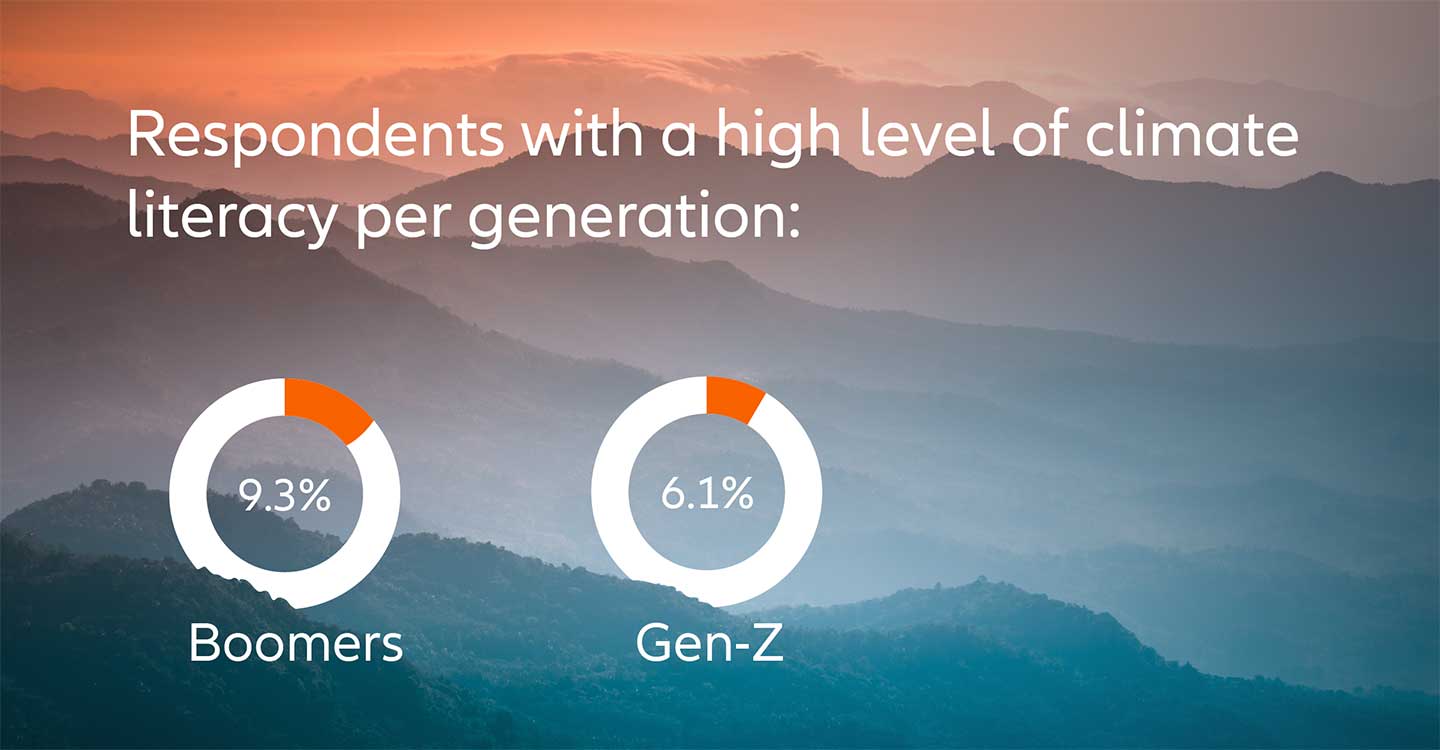The Allianz Group is one of the world's leading insurers and asset managers serving private and corporate customers in nearly 70 countries. Allianz customers benefit from a broad range of personal and corporate insurance services, ranging from property, life and health insurance to assistance services to credit insurance and global business insurance. Allianz is one of the world’s largest investors, managing around 761 billion euros* on behalf of its insurance customers. Furthermore, our asset managers PIMCO and Allianz Global Investors manage about 1.9 trillion euros* of third-party assets. Thanks to our systematic integration of ecological and social criteria in our business processes and investment decisions, we are among the leaders in the insurance industry in the Dow Jones Sustainability Index. In 2024, over 156,000 employees achieved total business volume of 179.8 billion euros and an operating profit of 16.0 billion euros for the Group.
Allianz Climate Literacy Survey 2023:
High anxiety meets low literacy
in the fight against climate change
In her Botany 101 class, Robin Wall Kimmerer—a scientist, SUNY distinguished professor, and the author of the NYT bestseller Braiding Sweetgrass—asked her students if they love the Earth. After a resounding ‘yes’ she then asked them: do you think that the Earth loves you back? This time around, the students were uncertain. The question seemed kind of unscientific, emotional, but on the other end of the emotions spectrum, where we do not usually venture to talk about environmentalism or climate action. So much of what we think about when it comes to climate change and climate action is finger-wagging, gloom-and-doom, and shame.
In discussions about climate change, we often talk about systemic causation, i.e. connections that might, on the first glance, appear to be disconnected, like the link between severe blizzards and global warming, for example. Because climate change is a systemic issue that involves a myriad of aspects and layers of interconnected problems, we tend to easily get lost in this jungle of issues, ending up confused, or worse—indifferent and disheartened. What Kimmerer does in her book is make the problem of systemic causation more palpable by reminding us of what we already know, but somehow tend to forget: that within an ecosystem, everything is connected. The transformative power of climate action therefore lies in recognizing this reciprocal relationship with our environment and understanding our inseparability from it.
However, when doom-and-gloom take over, we become distressed. As a result, according to the Reuters Institute’s Digital News Report 2023, we start to selectively avoid specific news that are repeated excessively or are felt to be ‘emotionally draining.’ Allianz Research’s newly published second edition of the Climate Literacy Survey confirms this: the omnipresence of certain topics leads to detachment and ignorance.
Reality check: waning climate literacy
This climate fatigue reflected in numbers is most apparent in opinions toward rising temperatures. Awareness of the risks of temperatures exceeding 1.5 °C has dropped from 67% to 50% over two years. Conversely, 35% now believe that nature and humans can adapt without severe impacts, up from 20% in 2021. This complacency, especially in disaster-prone countries like India (52%) and China (49%), is highly concerning.
The general lack of climate literacy impacts various aspects, from scientific knowledge to policy awareness and carbon footprint understanding. About 51% believe that merely halting emission increases will prevent a climate crisis, with this view varying from 35% in France to 61% in China. Only 31% of respondents recognize the need for a drastic emissions reduction, with figures at 26% in the U.S. and 43% in France.

Younger generations lag behind in climate literacy
Contrary to expectations, younger generations are less informed about climate issues than their older counterparts, with a higher proportion of low climate literacy and lower high literacy levels.
In Brazil and Italy, there seems to be a link between climate commitment and knowledge. Brazilian Millennials show the highest climate literacy at 14.9%, while in Italy, it's Gen-Z leading at 8.4%. However, despite these differences, overall climate knowledge across age groups remains worryingly low.
Action tied to awareness
Climate anxiety high despite knowledge gaps
Contrary to climate literacy levels, climate anxiety is notably high, with 76.8% of respondents expressing concern or alarm about climate change. Italy and Brazil lead with over 86% concerned, while in the U.S., two-thirds are anxious. Interestingly, 12.6% of U.S. participants deny the existence of climate change, the highest denial rate in the Survey. Age is a factor that doesn't significantly predict climate anxiety levels.
As climate anxiety increases, low climate literacy decreases. Knowledge helps mitigate unfounded fears, but it is not a complete solution. About a third of skeptics understand the basics of climate change, but remain in denial and nearly half of the highly concerned lack substantial knowledge. This indicates that emotions also play a crucial role in shaping lasting attitudes toward climate change.
The emotional dimension and populist manipulation

Policymaking in the face of climate illiteracy
In the upcoming election year, climate change could be a pivotal political issue, particularly as populist rhetoric increases around mitigation policies. To counteract this, policymakers should consider a three-pronged strategy:
- Clear and unwavering signals must be sent to industries and households about the commitment to the green transition. Establishing clear and shared goals is key to keeping the public engaged and challenging the perception that a net-zero lifestyle is exclusive or elitist.
- Merging consistent climate targets with social protection is crucial. The delay in promised compensations, like the climate dividend, only fuels climate populism.
- The fight for better climate literacy is paramount, especially in an emotionally charged climate debate.
You can explore the new edition of Allianz Research’s Climate Literacy Survey 2023 here:

About Allianz
* As of September 30, 2025.



